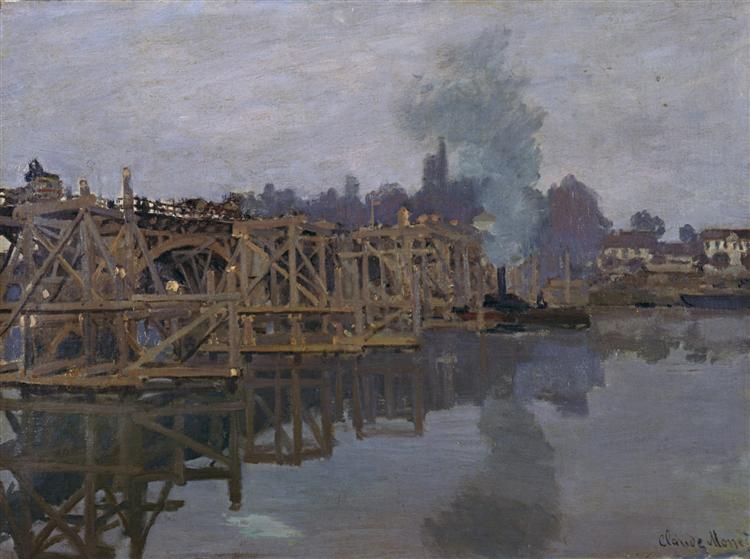Beskrivelse
The painting "The Bridge Under Repair" by Claude Monet in 1872 is an iconic work that exemplifies the artist's fascination with light and his ability to capture movement and the passage of time in nature. Through this piece, Monet not only presents a simple landscape but also addresses the theme of transformation and impermanence of the urban environment, which is characteristic of 19th century modernity.
Examining the composition of The Bridge Under Repair reveals a balanced and harmonious structure. The bridge, which stands at the centre of the work, acts as a powerful focal point, while its surroundings accompany the visual narrative. Monet employs the technique of loose, rapid brushstrokes that were characteristic of the Impressionist style, allowing the shapes to dissolve into amalgams of colour. This contributes to a sense of movement, as if the viewer can feel the breeze on the river reflecting the vibrant sky.
The use of colour in this work is remarkable. Monet uses a rich and varied palette that ranges from warm to cool tones: the reds and yellows of the sunlit areas contrast with the blues and greens of the water and surrounding vegetation. This play of colour not only defines the structure of the painting, but also conveys the atmosphere of the moment, evoking a feeling of freshness and clarity. Light becomes a vital character, highlighting the textures and details of the bridge, the boats on the water and the shore.
As for the characters, the painting does not feature any prominent human figures, suggesting that the focus is more on the interaction of the landscape with light than on human activity. Nevertheless, some silhouettes can be discerned in small boats, hinting at the presence of everyday life. This choice by Monet emphasizes a recurring theme in his work: the insignificance of the human being in the face of the magnitude of nature and the transformation of the environment.
It is interesting to note that "The Bridge Under Repair" is set in a historical context where infrastructure works were symbols of progress and modernity of the time. This work reflects this dualism between human intervention and nature. Monet, always interested in exploring the ephemeral, seems to ask the viewer about the price of progress and the inevitable interaction between the built and the natural.
Within the scope of Monet's production, this work is aligned with other paintings dealing with similar themes, such as "The Quay at the Port of Argenteuil" (1872) and "The Avenue of Linden Trees" (1873). Through these works, the viewer can begin to appreciate the evolution of Monet's style, his growing interest in light and atmospheric effects, elements that would eventually lead him to become one of the greatest exponents of Impressionism.
In conclusion, Claude Monet's "The Bridge Under Repair" is a work that not only depicts a landscape in transformation, but also invites reflection on the relationship between man, nature and progress. Its composition, use of color and atmosphere evoke a sense of transience, resonating deeply with the spirit of an era that was torn between modernity and nature. This work is further testimony to Monet's mastery in capturing not only what is visible, but what lies beyond the mere image, a constant challenge to see the world with renewed eyes.
KUADROS ©, a famous painting on your wall.
Hand-made oil painting reproductions, with the quality of professional artists and the distinctive seal of KUADROS ©.
Painting reproduction service with satisfaction guarantee. If you are not completely satisfied with the replica of your painting, we will refund 100% of your money.

